| 2000 Jahre Christentum | |
|---|---|
| Also known as | 2000 Years of Christianity |
| Genre | History, documentary |
| Country of origin | Germany |
| No. of seasons | 1 |
| No. of episodes | 13 |
| Production | |
| Running time | 45 minutes |
| Original release | |
| Release | 7 November 1999 – 20 February 2000 |
2000 Jahre Christentum (2000 Years of Christianity) is a German documentary series on the history of Christianity prior to the year 1999.
The historical series begins with the rise of Christianity, as it spread across the world over the course of 2,000 years. Werner Herzog wrote and directed the ninth episode which shows the piety of people today, especially the descendants of the original Christian followers in Latin America. The last part of the series deals with questions of the future, which Christians often pose today.
The series was produced by ARD in collaboration with the Munich Tellux production company. The project was funded by the Bavarian Film and Television Fund. The individual episodes were directed by different people. Bernd Grote produced the series and won a 2000 Bavarian Television Award.
Some computer animation was used in the documentary, but most of the actual footage was filmed on location. Production costs of the series amounted to EUR 3.4 million.
The series originally aired from 7 November 1999 to 20 February 2000. It was released in 2000 on VHS and DVD in 2004. The DVD version was released with additional English and Dutch-language versions.

Last of the Summer Wine is a British sitcom set in Yorkshire created and written by Roy Clarke and originally broadcast by the BBC from 1973 to 2010. It premiered as an episode of Comedy Playhouse on 4 January 1973, and the first series of episodes followed on 12 November 1973. Alan J. W. Bell produced and directed all episodes of the show from late 1981 to 2010. The BBC confirmed on 2 June 2010 that Last of the Summer Wine would no longer be produced and the 31st series would be its last. Subsequently, the final episode was broadcast on 29 August 2010. Since its original release, all 295 episodes, comprising thirty-one series—including the pilot and all films and specials—have been released on DVD. Repeats of the show are broadcast in the UK on BBC One, Gold, Yesterday, and Drama. It is also seen in more than 25 countries, including various PBS stations in the United States and on VisionTV in Canada. With the exception of programmes 'rebooted' after long hiatuses, Last of the Summer Wine is the longest-running TV comedy programme in Britain and the longest-running TV sitcom in the world.

Cosmos: A Personal Voyage is a thirteen-part, 1980-1981 television series written by Carl Sagan, Ann Druyan, and Steven Soter, with Sagan as presenter. It was executive-produced by Adrian Malone, produced by David Kennard, Geoffrey Haines-Stiles, and Gregory Andorfer, and directed by the producers, David Oyster, Richard Wells, Tom Weidlinger, and others. It covers a wide range of scientific subjects, including the origin of life and a perspective of our place in the universe. Owing to its bestselling companion book and soundtrack album using the title, Cosmos, the series is widely known by this title, with the subtitle omitted from home video packaging. The subtitle began to be used more frequently in the 2010s to differentiate it from the sequel series that followed.
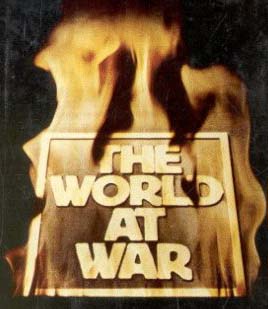
The World at War is a 26-episode British documentary television series that chronicles the events of the Second World War. It was produced in 1973, at a cost of £900,000, the most expensive factual series ever produced. It was produced by Jeremy Isaacs, narrated by Laurence Olivier and included music composed by Carl Davis. The book, The World at War, published the same year, was written by Mark Arnold-Forster to accompany the TV series.
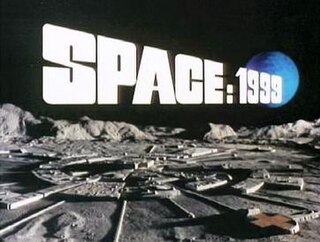
Space: 1999 is a British science-fiction television programme that ran for two series from 1975 to 1977. In the opening episode, set in the year 1999, nuclear waste stored on the Moon's far side explodes, knocking the Moon out of orbit and sending it, as well as the 311 inhabitants of Moonbase Alpha, hurtling uncontrollably into space. Space: 1999 was the last production by the partnership of Gerry and Sylvia Anderson and was the most expensive series produced for British television up to that time. The first series was co-produced by ITC Entertainment and Italian broadcaster RAI, while the second series was produced solely by ITC.

The Protectors is a British television series, an action thriller created by Gerry Anderson. It was Anderson's second TV series to exclusively use live actors as opposed to marionettes, and his second to be firmly set in contemporary times. It was also the only Gerry Anderson–produced television series that was not of the fantasy or science fiction genres. It was produced by Lew Grade's ITC Entertainment production company. Despite not featuring marionettes or any real science fiction elements, The Protectors became one of Anderson's most popular productions, easily winning a renewal for a second series. A third series was in the planning stages when the show's major sponsor, Brut, ended its funding and thus forced the series' cancellation.

The Wednesday Play is an anthology series of British television plays which ran on BBC1 for six seasons from October 1964 to May 1970. The plays were usually original works written for television, although dramatic adaptations of fiction also featured. The series gained a reputation for presenting contemporary social dramas, and for bringing issues to the attention of a mass audience that would not otherwise have been discussed on screen.

Walking with Dinosaurs is a 1999 six-part nature documentary television miniseries created by Tim Haines and produced by the BBC Science Unit, the Discovery Channel and BBC Worldwide, in association with TV Asahi, ProSieben and France 3. Envisioned as the first "Natural History of Dinosaurs", Walking with Dinosaurs depicts dinosaurs and other Mesozoic animals as living animals in the style of a traditional nature documentary. The series first aired on the BBC in the United Kingdom in 1999 with narration by Kenneth Branagh. The series was subsequently aired in North America on the Discovery Channel in 2000, with Avery Brooks replacing Branagh.
Eyes on the Prize: America's Civil Rights Movement is an American television series and 14-part documentary about the 20th-century civil rights movement in the United States. The documentary originally aired on the PBS network, and it also aired in the United Kingdom on BBC2. Created and executive produced by Henry Hampton at his film production company Blackside, and narrated by Julian Bond, the series uses archival footage, stills, and interviews by participants and opponents of the movement. The title of the series is derived from the title of the folk song "Keep Your Eyes on the Prize", which is used as the opening theme music in each episode.

The Young Indiana Jones Chronicles is an American television series that aired on ABC from March 4, 1992, to July 24, 1993. Filming took place in various locations around the world, with "Old Indy" bookend segments filmed in Wilmington, North Carolina and on the campus of the University of North Carolina at Wilmington. The series was a Lucasfilm production in association with Amblin Television and Paramount Television.
People's Century is a television documentary series examining the 20th century. It was a joint production of the BBC in the United Kingdom and PBS member station WGBH Boston in the United States. The series was first shown on BBC in the 1995, 1996 and 1997 television seasons before being broadcast in the US and elsewhere in the world in 1998.

A nature documentary or wildlife documentary is a genre of documentary film or series about animals, plants, or other non-human living creatures. Nature documentaries usually concentrate on video taken in the subject's natural habitat, but often including footage of trained and captive animals, too. Sometimes they are about wildlife or ecosystems in relationship to human beings. Such programmes are most frequently made for television, particularly for public broadcasting channels, but some are also made for the cinema. The proliferation of this genre occurred almost simultaneously alongside the production of similar television series which is distributed across the world.
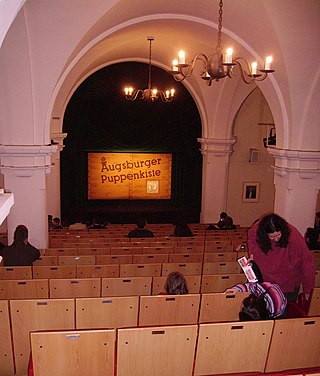
The Augsburger Puppenkiste is a marionette theater in Augsburg, Germany.
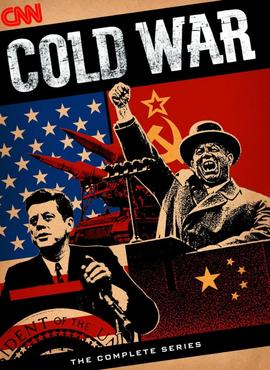
Cold War is a twenty-four episode television documentary series about the Cold War that first aired in 1998. It features interviews and footage of the events that shaped the tense relationships between the Soviet Union and the United States.
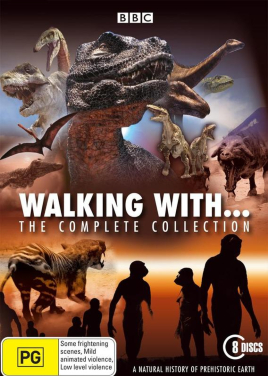
Walking with... is a palaeontology media franchise produced and broadcast by the BBC Studios Science Unit. The franchise began with the series Walking with Dinosaurs (1999), created by Tim Haines. By far the most watched science programme in British television during the 20th century, Walking with Dinosaurs spawned companion material and four sequel series: Walking with Beasts (2001), Walking with Cavemen (2003), Sea Monsters (2003) and Walking with Monsters (2005). Each series uses a combination of computer-generated imagery and animatronics, incorporated with live action footage shot at various locations, to portray prehistoric animals in the style of a traditional nature documentary.

The University of Television and Film Munich is a publicly funded film school in Munich, Germany. The school was established in 1966 by decree of the Bavarian government. The University of Television and Film Munich is one of Germany's most reputable film schools with about 350 students enrolled.
Christian "Chris" Peschken is a German-American cameraman, director, producer and screenwriter. He has been involved in film and radio and television production since 1974.
Bayerischer Fernsehpreis is an award presented by the government of Bavaria, Germany since 1989. The prize symbol is the "Blue Panther", a figure from the Nymphenburg Porcelain Manufactory. The prize money is €10,000.

Zorro is an American Western superhero television series featuring Duncan Regehr as the character of Zorro. Regehr portrayed the fearless Spanish hero and fencer on The Family Channel from 1990 to 1993. The series was shot entirely in Madrid, Spain and produced by New World Television (U.S.), The Family Channel (U.S.), Ellipse Programme of Canal Plus (France), Beta TV (Germany), and RAI (Italy). 88 episodes of the series were produced, Raymond Austin directed 55 episodes and produced 37. There were 10 more episodes made than the first Zorro television series, which was produced by Disney in the late 1950s.

Norbert Busè is a German documentary filmmaker, film producer, and director.